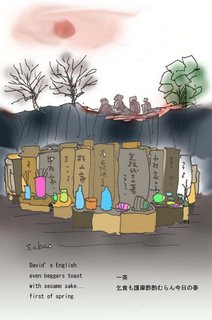
1795, age 33
一茶
乞食も護摩酢酌むらん今日の春
kojjiki mo gomazu kumuran kyô [no] haru
David’s English
even beggars toast
with sesame sake...
first of spring
his comment
I originally thought that this was a scene at a Shinto shrine. I was misled by the kanji with which Issa writes the word, goma; he uses the characters that signify "holy fire" instead of those that mean "sesame seeds." Shinji Ogawa set me straight. He adds that kumu, in this context, means "drink." The ending -ran changes the verb into a conjecture ("they may or may not be drinking"). In my re-translation, I use the verb "toast" in its simple, present tense, but Issa more exactly is saying, "perhaps even beggars may toast..." In English, the "perhaps" and "may" weaken the poem, so I've left them out.
sakuo comment.
sesame binegar is sake whick is used as secret language of priest.
護摩酢は僧侶の隠語で酒の事
Renku
お墓で正月、乞食のパーティ
ohaka de syougatu kojiki no paatii
New Year in the grave yard
beggar’s party.

No comments:
Post a Comment